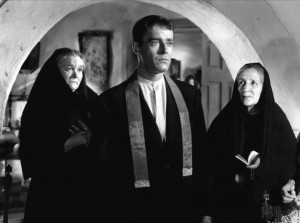As a priest with decades of experience, having heard many thousands of confessions, I can attest to the importance of this sacrament for a healthy society. As the Catechism of the Catholic Church says, to the eyes of faith no evil is graver than sin and nothing has worse consequences for sinners themselves, for the Church, and for the whole world. Therefore, we have been given this sacrament as a means to return to the grace of God, who is rich in mercy and solicitous of our salvation. In addition, the graces received in the sacrament help us combat temptations to sin again.
One must ask for this precious gift for oneself and for others. In my experience in bringing into the Church through God’s grace a goodly number converts, when I ask them why they wanted to become Catholic, a common reply is, “Father, I want to be cleansed of my sins.” Oftentimes they will follow this by saying, “and then I will be able to receive our Lord and Savior in the Eucharist.”
All of this is a prologue to an interesting development: Catholic priests being portrayed respectfully as confessors in several television series. The shows I am thinking of (which are far from conveying Christian values across the board) generally depict the priests in a positive way, even when those going to Confession do not necessarily accept the advice that is given to them.
Going back a few years to the first one I have in mind involves the wife of Tony Soprano in The Sopranos. Poor woman that she is (with a very bad marriage, to put it mildly), she goes to confession frequently, attends Mass, and encourages her children to do the same.
More recently, the multiple Emmy award-winning popular series Mad Men, which has just completed its long run, features some poignant scenes of spiritual direction by a priest with a woman who has had an abortion but nonetheless finds it difficult to admit it to him. This is particularly remarkable because the series is full of men and women who live only for pleasure and wealth and are constantly breaking their wedding vows. To my knowledge, none of the characters is Catholic except this one.
The final show I draw your attention to is called (of all things) Daredevil! The hero is a lawyer by day and a vigilante by night in the Hell’s Kitchen neighborhood of New York City, where he grew up. Most important, he is a SERIOUS Catholic who confesses his sins and receives spiritual direction from his parish priest.

Judging from what I’ve seen thus far, I do not think that his character would qualify for canonization if his life ended at this point in his spiritual development. But it is refreshing to see a young man on TV seeking guidance and penance from a fine confessor. Who knows, perhaps the character of the priest is partly based on the current real pastor in Hell’s Kitchen: Fr. George Rutler, a great confessor and a name many TCT readers may know from his writing.
In any case, it’s impossible to deny that there’s some evidence of a resurgence of respect in the entertainment world for the role of confessor. I am sure that Frank Capra and John Ford and Alfred Hitchcock – all of them Catholic directors who were not afraid to show it – would approve.
A prime example of Hitchcock’s creative incorporation of his Catholicism occurs, for example, in his 1953 movie I Confess, where Montgomery Clift portrays a priest charged with murder. He cannot defend himself properly, because he cannot reveal the confession of the true murderer. Plot twists involving the seal of the confessional have long fascinated many writers, including scriptwriters, because of the potentially high stakes: imprisonment or execution on the one hand versus possible damnation on the other.
Another classic movie showcasing confession is John Ford’s The Fugitive, his version of Graham Greene’s powerful novel The Power and the Glory. The book portrayed a whisky-priest-turned-martyr during the Mexican persecutions of the 20th century, which produced many real-life martyrs such as Blessed Miguel Augustin Pro. (Ford’s priest is torn by doubt and cowardice rather than alcohol and lechery.) The priest is trapped into revealing himself through an appeal to hear a dying man’s confession.
And there are also some good books worth consulting on Catholic movies and moviemakers. A good place to start is Catholics in the Movies edited by Colleen McDannell. In addition, the recently published Oasis: Conversion Stories of Hollywood Legends, by Mary Claire Kendall and Dolores Hart, presents some amazing stories of Catholic converts and reverts in Tinsel Town.
As it happens, thanks to Pope Francis, we will be celebrating a year of mercy beginning on December 8 of this year. One can only hope that millions of people take advantage of the great sacrament of mercy. To that end, we should do our best by word and example to bring people to the confessional, which in turn will bring them worthily to the altar to receive the Lord Jesus in the Eucharist. And these examples from popular film and television can be a big help.














